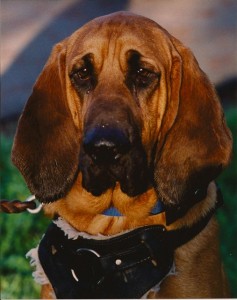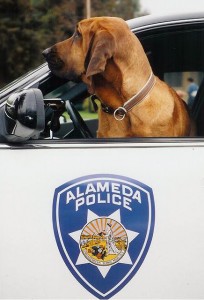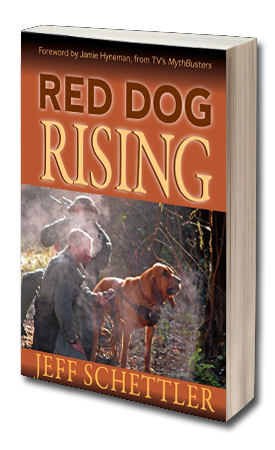
Ronin Red Dog Rising
Ronin was a modern police bloodhound who worked the streets of California hunting criminals and missing persons for 10 years. He was the first full-time municipal police bloodhound in the state of California.
What can I write about my bloodhound, Ronin without giving away too much of the book? That is really a good question. I have to write just enough to get you interested, I suppose. So let’s see…hmmmm…
Well, Ronin was a Bloodhound and uncommon one at that. His real AKC name was Bo’s Mongo Dog. I got him at about 11 weeks of age from Susanville, CA, with the intention of training him to be a man hunter. The problem was, I had no idea what I was looking for and had no experience with bloodhounds. So, perhaps, in a way, Ronin found me. We seemed to bond right off the bat and there was something about him that I knew was really special from the beginning. I did not know it then, but he was going to change my life forever.
Ronin was what is referred to as a “Red” bloodhound with black accents on the muzzle and around the eyes. Bloodhounds can also be found in a light brown color called “liver” and “black & tan”; the latter being the most well known. Unlike many of his brethren, Ronin was relatively tight faced with shorter ears than normal. His skin was not quite as loose either. The breed standard for show dogs nowadays is a really baggy faced dog with drooping eyes, jowls, and skin that weighs in at about 100-125 pounds. In his hay day, Ronin weighed in at about 105. Simply based on his appearance, Ronin would probably never win a dog show but that was never his job to begin with. He was a working dog and his lean, tight frame actually helped his career from a physical standpoint.
History tells us that the Bloodhound is the ultimate nose vacuum for human scent and that they can often hunt down people who have been missing for many days. The line between the myths and the facts about Bloodhounds has always been a little fuzzy. The simple truth is that the bloodhound was a dog bred for a purpose at one time and that purpose was to hunt animals and later humans. Along the way, the breed encountered the show ring and things began to change a bit. The working bloodhound was considered a tracking dog. This title has recently changed to what is known as “Trailing”.

Ronin Alameda Police
Trailing, though a relatively modern term, actually has it’s roots in English and early American history when bloodhounds were used to hunt criminals, and in the case of our original colonies, marauding native American tribes in conflict with early settlers. The hounds were “scented” on a particular human odor and allowed the freedom to follow that scent wherever it might have led. The history for this can actually be found in original want ads for the period of colonists looking for bloodhounds.
Trailing is a descriptive word for the art of allowing a dog to follow human scent wherever human scent might be, on the ground or in the air. It can also be taken one step further by adding scent discrimination to the equation. Each and every animal, human or otherwise, produces a distinctive odor based on species and other sub-determining factors such as infirmity, relative age, sex, and certain individual identifying traits. The amount of odor produced is dependant upon several primary factors, mental condition such as fear or anger, exertion, and relative health issues.
Because of scent discrimination and the tenacity for the job, a good trailing bloodhound can be an incredible asset in any criminal or missing person investigation as long as it is used in accordance with its capabilities. Ronin turned out to be one of those really good assets and was used on hundreds of real cases throughout California and later, other States as well. Ronin also turned out to be quite a celebrity and because of his work we often found ourselves on the evening news and, occasionally, even CNN. We worked some very interesting cases over the years, many of which I write about in Red Dog Rising. Turn the page and try one on for size!








